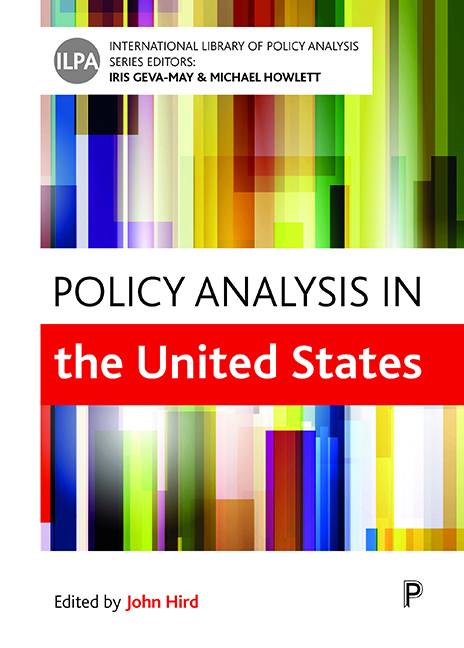Book contents
- Frontmatter
- Contents
- List of tables and figures
- Notes on contributors
- Editors’ introduction to the series
- Introduction
- Part One History, styles, and methods of policy analysis in the United States
- Part Two Policy analysis by governments
- Part Three Policy analysis outside of government
- Part Four Policy analysis education and impact internationally
- Index
Eighteen - The influence of policy analysis in the United States on the international experience
Published online by Cambridge University Press: 12 April 2022
- Frontmatter
- Contents
- List of tables and figures
- Notes on contributors
- Editors’ introduction to the series
- Introduction
- Part One History, styles, and methods of policy analysis in the United States
- Part Two Policy analysis by governments
- Part Three Policy analysis outside of government
- Part Four Policy analysis education and impact internationally
- Index
Summary
Although there could well be quibbles about the extent to which this characterization is valid, it is difficult to argue that the modern science, or art, of policy analysis did not begin in the United States. Policymakers had always had advisors who gave them ideas about policy and attempted to prevent them from making egregious errors, but that advice was generally far from systematic. With the work of Harold Lasswell and his colleagues (Lasswell 1951) a more systematic conception of public policy and policy analysis was developed and began to be diffused within the United States and later to the rest of the world.
To argue that the United States has played a central role in the development of policy analysis is not meant to chauvinistic, nor does it deny the important contributions of scholars and practitioners in many other countries (see Radin 2013). Rather, it is intended to recognize that despite the general disdain that the population has for government, or perhaps because of it, government in the United States has been the source, and target, of many innovations in public policy analysis, and at least some elements of academia in the United States have had a greater commitment to involvement with policy than has been true for the academy in other societies.
To understand the influence of policy analysis in the United States on the rest of the world also requires more than a little attention to the historical development of policy analysis and the tools associated with that mode of policy advice within government. Some of the specific mechanisms for policy analysis discussed below have long fallen out of favor with policymakers and with their academic counterparts, but they remain significant components of the foundation on which contemporary policy analysis is constructed. As such, these ideas concerning public policy condition a good deal of contemporary policy analytic work. In addition, processes of diffusion in which the policy analysis community in the United States has played a significant part in the development of policy analysis around the world, and to understand that diffusion, requires an initial understanding of the developments within the Unite States.
The above having been said, European scholars in particular have been doing significant amounts of high-quality public policy work, albeit often under different guises (see Sabatti 1973 for an early statement).
- Type
- Chapter
- Information
- Policy Analysis in the United States , pp. 339 - 352Publisher: Bristol University PressPrint publication year: 2018

